
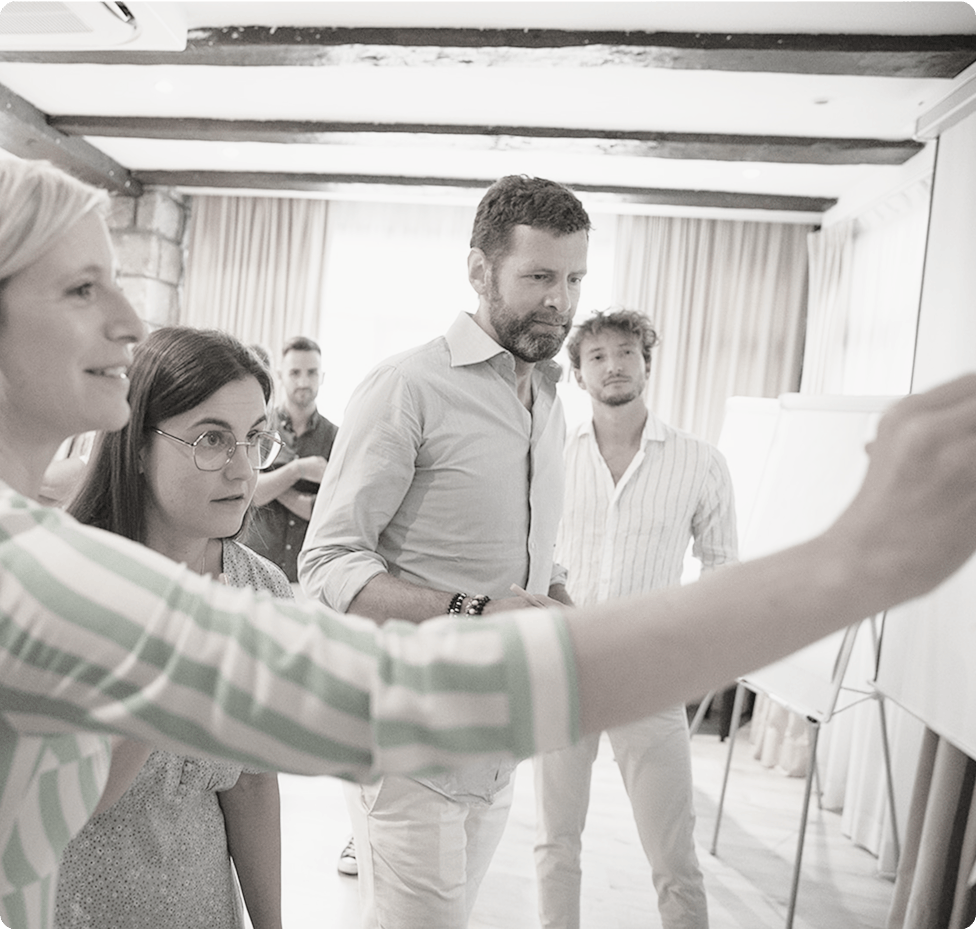
Agile Project Execution
We apply an Agile approach to your strategic projects, ensuring focus, continuous improvement, and adaptability.
We kick-off Agile teams, developing the practices and skills needed to deliver frequently and adapt when necessary.
We keep stakeholders aligned, by co-creating common goals and fostering frequent alignments.

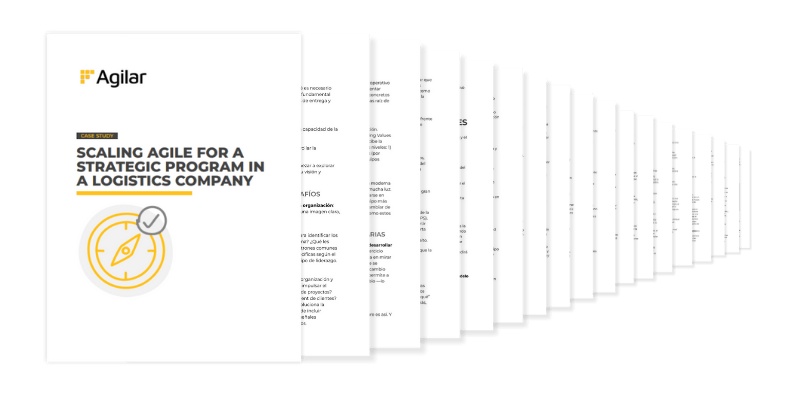
Discover how we helped a logistics company adapt to changes in the market and their business strategy in a change initiative that impacted multiple parts of the organization with our case study “Scaling Agile for a Strategic Program in a Logistics Company”. Download it for free and get ready to transform your operations.
Typical challenges we solve
Bureaucratic governance
Programs waste a lot of time adhering to slow and complex governance practices.
Lack of adaptability
When unexpected problems arise, project teams are slow to adapt and value delivery is impacted.
High delivery risk
Lack of alignment between delivery teams increase the risk of delays and failures.
Lack of focus
Delivery teams struggle to slice and prioritize work effectively resulting in delays and under-whelming outcomes.
“Agilar was a key partner in our Agile transformation - their experience in scaling, organizational design, and change management was invaluable in helping us deal with the challenges of changing our organization and improving our agility.”
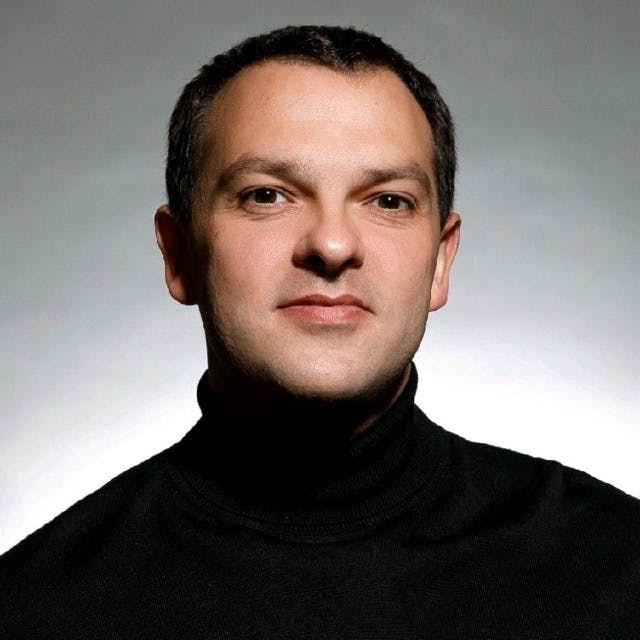
Sergii Martyshko
Agile Transformation Lead Europe, ABInBev
Why companies choose to work with us
Continuous improvement and transparency
Project teams that share a common way of working - iterative, continuous improvement (product & process), and transparency on progress.
Outcome focused
We help programs understand customer needs and define clear goals that help teams prioritize the work that needs to be done.
Aligned objectives
We onboard key stakeholders into the program and facilitate regular conversations to ensure alignment on objectives and priorities.

Improved risk management
By embedding continuous learning, transparency on impediments, and a “fail fast” culture, we help leaders improve their ability to manage risk.
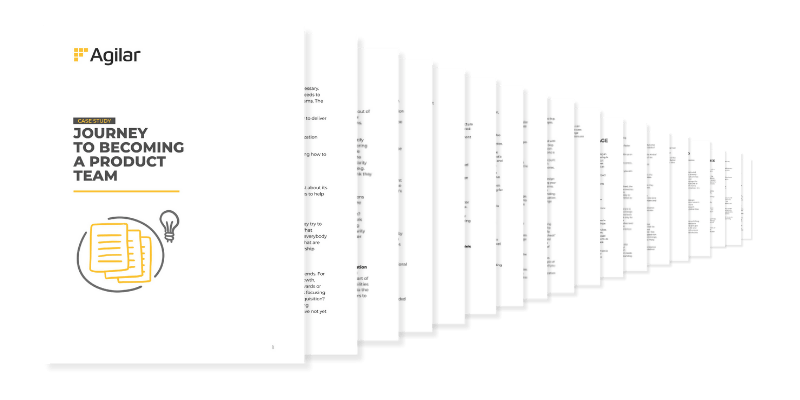
Discover how a logistics company used an Agile approach to transform a product team and deliver strategic business projects with our case study "Journey to becoming a Product Team". Download it for free and get inspired to start your own.
Case Studies
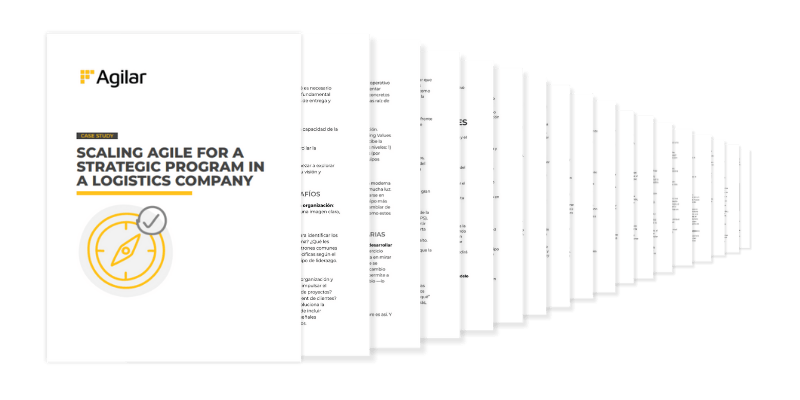
Scaling Agile For a Strategic Program In a Logistics Company
What does it take to redesign a country’s delivery model in just months? This case study reveals how one postal operator embraced Agile to meet a national deadline—by acting before they felt ready, building cross-functional teams, and learning through fast-paced delivery.
Go to Case StudyFor leaders who want to improve their organization
Typical roles interested in this topic
Product Managers, who need to deliver a strategic initiative impacting many parts of the organization.
Team Leads, who want to improve their teams’ ability to deliver value consistently.
Organizational Leaders, who want to improve the governance and outcomes of their key initiatives.
Program Managers, who have a complex initiative impacting multiple teams and stakeholders
Related Tools
Team Bootcamp
A 1-4 days hands-on workshop where program leaders, key stakeholders and delivery teams align on goals, customer needs, team composition, and way of working for program teams. They also (re-)define and (re-)prioritize the work that needs to be done, meaning they are ready to start their first Sprint.
Explore further
Companion
Our own change management tool, it supports the assessment of teams/tribes, tracking of key innovation KPIs or goals, and visualizing the overall status of the innovation change initiative. This transparency supports the growth of innovation practices and the improvement of teams’ ability to learn & adapt.
Try it for free
Why do our clients continue to work with us?
Pragmatism & flexibility
We are framework-agnostic and believe impactful change starts not from processes and structures, but rather from the organization's strategy, culture, and goals. Focusing on those (rather than frameworks) makes change grounded to the reality of teams and value delivery. For delivery initiatives, this pragmatism means changes are focused around the goal of improving alignment, collaboration, and value delivery. And adapting whatever is not working well along the way, thus maximizing the chances for positive outcomes.

Change management expertise
We believe the biggest reason change initiatives fail is not because of lack of leadership support, resistance to change, or lack of budget. We believe change fails mostly because of lack of good change management. Our approach combines the Kotter model with our experience in defining leading and lagging indicators that enable our clients to track the impact the change is having on the business. For delivery initiatives, this means ensuring there is alignment between teams and stakeholders on goals, priorities, and way of working. Issues are identified early and addressed quickly.

Broad Industry coverage
We have extensive experience in a broad range of vertical industries, such as Fast Moving Consumer Goods (FMCG), Finance & Insurance, Telco, Gaming, and Manufacturing. We are also pioneers in taking agility beyond product / software teams and into the domain of business or operational teams.

Related Articles you may be interested in
Nicolás Chirio
07 Apr, 2025
New Project? Here's What to Do Before You Start Doing
Before you rush into hitting milestones, take a moment to set things up right. This step-by-step guide helps you lay the foundation for a successful project—less rework, more impact, and better collaboration. Checklist included.
Go to ArticleTiago Garcez
28 Mar, 2025
3 Key Questions For Organizational Design
This guide starts with three questions to shape your operating model: What is your product, how do you manage BAU, and do you need two layers of governance? It offers practical ways to structure teams, balance ongoing work, and align governance.
Go to ArticleGet in touch!
Let's discuss your needs, we’re eager to listen! Fill out our form below and we will get back to you as soon as possible.